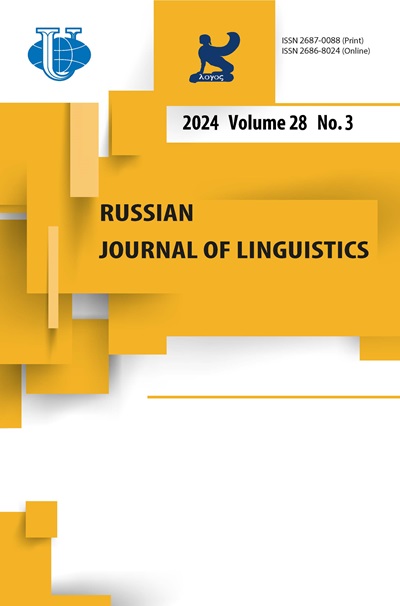Search
Issue
Title
Authors
|
Komalova L.R., Kalyuzhnaya L.V. |
|
Zagidullina M.V., Ghodrati A., Shafaghi M. |
|
Tajeddin Z., Rassaei Moqadam H. |
|
Dementyev V.V. |
|
Kuznetsova S.V. |
|
Sokolova O.V., Feshchenko V.V. |
|
Kiklewicz A. |
|
Kalinin O.I., Ignatenko A.V. |
|
Petrova A.A., Privalova I.V., Kosova K.O. |
|
Bobrova E.D. |
|
Kordestanchi B., Sarkhosh M., Moafian F. |
|
Krilov A.A. |
|
Oishi E. |
|
Ivanova S.V. |
|
Zavyalova V.L. |
|
Sahipova Z.G. |
|
Kuznetsova S.V. |
|
Dementyev V.V. |
|
Ionova S.V. |
|
Borisova E.S. |
|
Bazhenova I.V. |
|
Dementyev V.V., Stepanova N.B. |
|
Gazizov R.A. |
|
Zavyalova V.L. |
|
Chernyshev M.Y. |
|
Gornostaeva A.A. |
|
Klushina N.I. |
|
Yakushevich I.V. |
|
Seredenko V.M. |
|
Duskaeva L.R. |
|
Ermoshin Y.A. |
|
Nguyen Thu Huong -. |
|
Kupriyanova M.E. |
|
Vlasyan G.R., Kozhukhova I.V. |
|
Khrisonopulo E.Y. |
|
Nguyen Thu Huong -. |
|
Lassan E.R. |
|
Fedoseeva L.N. |
|
Alemi M., Pazoki Moakhar N., Rezanejad A. |
|
Haugh M., Chang W.M. |
|
Nemov A.A. |
|
Izotov A.I. |
|
Spronck S. |
|
Krasina E.A. |
|
Seredenko V.M. |
|
Krylova O.A. |
|
Korzeniewska-Berczyńska J. |
|
Fedoseeva L.N. |
|
Sun Y., Kalinin O.I., Ignatenko A.V. |
|
Komalova L.R. |
|
Schelchkova E.B. |
|
Mamedov A.N. |
|
Chernyshev M.Y. |
|
Urzhumtseva A.О. |
|
Leontovich O.A. |
|
ALEMI M., LATIFI A., NEMATZADEH A. |
|
Terentieva E.D. |
|
Ivanova Y.E. |
|
Schelchkova E.B. |
|
Schelchkova E.B. |
|
Issers O.S., Halvorson S. |
|
Deveci T., Midraj J. |
|
Kotorova E.G. |
|
Karpovskaya N.V. |
|
Alontseva N.V., Ermoshin Y.A. |
|
Gusarov D.A., Semenov A.L. |
|
Mamedov A.N. |
1 - 67 of 67 Items
Search tips:
- Search terms are case-insensitive
- Common words are ignored
- By default only articles containing all terms in the query are returned (i.e., AND is implied)
- Combine multiple words with OR to find articles containing either term; e.g., education OR research
- Use parentheses to create more complex queries; e.g., archive ((journal OR conference) NOT theses)
- Search for an exact phrase by putting it in quotes; e.g., "open access publishing"
- Exclude a word by prefixing it with - or NOT; e.g. online -politics or online NOT politics
- Use * in a term as a wildcard to match any sequence of characters; e.g., soci* morality would match documents containing "sociological" or "societal"













